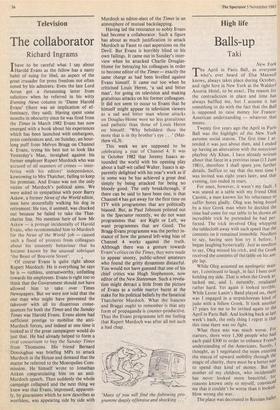Television
The collaborator
Richard Ingrams
Ihave to be careful what I say about A Harold Evans as the fellow has a nasty habit of suing for libel, an aspect of the great crusader for press freedom not often noted by his admirers. Even the late Lord Arran got a threatening letter from solicitors when he referred in his witty Evening News column to 'Dame Harold Evans' (there was an implication of ef- feminacy, they said). Having spent some months in obscurity since he was fired from the Times in March 1982 Evans has now emerged with a book about his experiences which has been launched with embargoes, press conferences and, on Sunday, an hour- long puff from Melvyn Bragg on Channel 4. Evans, trying his best not to look like Yesterday's Man, inveighed against his former employer Rupert Murdoch who was accused of all manners of crimes — inter- fering with his editors' independence, kowtowing to Mrs Thatcher, failing to keep his promises. And Evans was not the only victim of Murdoch's political aims. We were asked to sympathise with poor Barry Askew, a former News of the World editor, seen here mournfully walking his dog in retirement. He too, it seemed, was chucked out because he failed to take the That- cherite line. No mention here of how Mr Askew — a protege incidentally of Harold Evans, who recommended him to Murdoch for the News of the World job — caused such a flood of protests from colleagues about his unseemly behaviour that he became known by the unusual sobriquet 'the Beast of Bouverie Street'.
Of course Evans is quite right about Rupert Murdoch. He is everything he says he is — ruthless, untrustworthy, unfeeling towards his employees. Evans is right too to think that the Government should not have allowed him to take over Times Newspapers. But we were not told that the one man who might have prevented the takeover with all its disastrous conse- quences for both the Times and the Sunday Times was Harold Evans. Evans alone had sufficient prestige to mobilise the anti- Murdoch forces, and indeed at one time it looked as if the great campaigner would do just that. He had already helped to form a rival consortium to buy the Sunday Times from Thomsons. His friend Bernard Donoughue was briefing MPs to attack Murdoch in the House and demand that the matter be referred to the Monopolies Com- mission. He himself wrote to Jonathan Aitken congratulating him on an anti- Murdoch speech. Then suddenly the whole campaign collapsed and the next thing we knew was that Evans, impressed, apparent- ly, by guarantees which he now describes as worthless, was appearing side by side with Murdoch as editor-elect of the Times in an atmosphere of mutual backslapping.
Having led the resistance so nobly Evans had become a collaborator. Such a figure has about as much justification to attack Murdoch as Faust to cast aspersions on the Devil. But Evans is horribly blind to his own failings. It came out in Sunday's inter- view when he attacked Charlie Douglas- Home for betraying his colleagues in order to become editor of the Times — exactly the same charge as had been levelled against Evans himself. It came out too when he criticised Louis Heren, 'a sad and bitter man', for going on television and making gratuitous attacks on his former colleagues. It did not seem to occur to Evans that he himself might appear to television viewers as a sad and bitter man whose attacks on Douglas-Home were no less gratuitious and pathetic than those of Louis Heren on himself. 'Why beholdest thou the mote that is in thy brother's eye ...' (Mat- thew vii,3).
This week we are supposed to be celebrating a year of Channel 4. It was in October 1982 that Jeremy Isaacs as- tounded the world with his opening play about a half-wit called Walter. Isaacs is ap- parently delighted with his year's work as if in some way he has achieved a great deal simply by being attacked for being no bloody good. The only breakthrough, if there can be said to have been one, is that Channel 4 has got away for the first time on ITV with programmes that are politically biassed. But, as Paul Johnson pointed out in the Spectator recently, we do not want programmes that are Right or Left, we want programmes that are Good. The Bragg-Evans programme was the perfect in- stance of how the general left-wing bias of Channel 4 works against the truth. Although there was a gesture towards Evans's critics on the Times, they were made to appear snooty, public-school amateurs who found the gritty dynamism distastful. You would not have guessed that one of his chief critics was Hugh Stephenson, now editor of the New Statesman. Such a revela- tion might detract a little from the picture of Evans as a noble martyr burnt at the stake for his political beliefs by the fanatical Thatcherite Murdoch. What the Isaacses and Braggs ought to remember is that any form of propaganda is counter-productive. Thus the Evans programme left me feeling that Rupert Murdoch was after all not such a bad chap.
'Many of you will find the following pro-, gramme deeply offensive and shocking . . . '














































 Previous page
Previous page